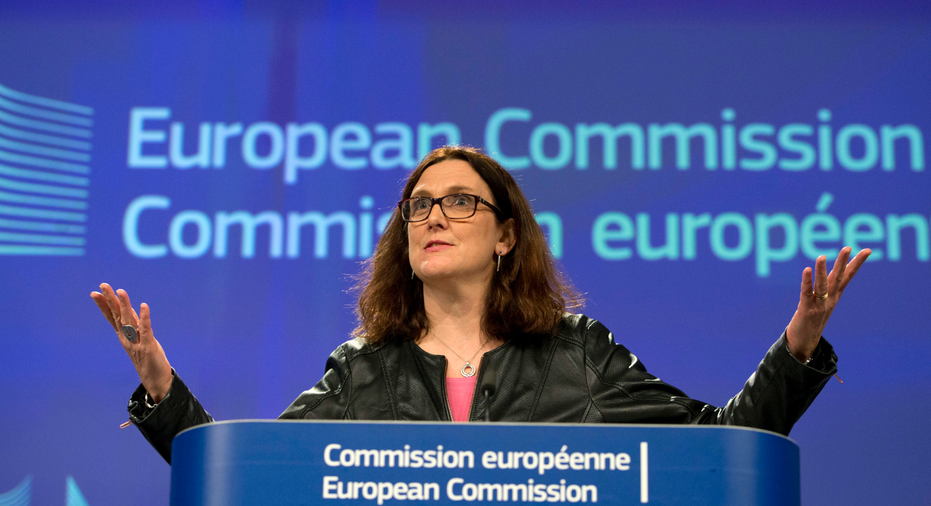EU ready for a 'stupid' trade war if Trump slaps on tariffs

BRUSSELS – The European Union says it's ready to retaliate against the U.S. over President Donald Trump's proposed tariffs on steel and aluminum — with counter-measures against iconic U.S. products like Harley Davidson motorcycles, Levi's jeans and bourbon.
The EU threat and Trump's insistence that the tariffs will go ahead escalate the risk of a trade war, in which countries try to punish each other by increasing taxes on traded goods. In the end, that tends to hurt all sides as exporting producers suffer but so do consumers who face higher costs, experts say.
There was some hope that free trade proponents in the White House, like economic adviser Gary Cohn, would dissuade Trump from going ahead with the tariffs. But Cohn's resignation Tuesday dealt a blow to that expectation.
EU Trade Commissioner Cecilia Malmstroem said Wednesday that the EU is circulating among member states a list of U.S. goods to target with tariffs so that it can respond as quickly as possible.
The list so far includes U.S. steel and agricultural products, as well as other products like bourbon, peanut butter, cranberries and orange juice.
She did not say what level of tariffs the EU would set, leaving it unclear what the economic impact would be.
"This is basically a stupid process, the fact that we have to do this. But we have to do it," EU Commission President Jean-Claude Juncker had said Friday. "We can also do stupid."
The EU considers itself to be caught in the crossfire of this particular trade dispute, in which Trump has mainly singled out China for being unfair in its commercial deals.
Trump last week said his government would levy penalties of 25 percent on imported steel and 10 percent on aluminum imports, but did not say whether traditional allies like the EU and Canada would be exempt. On Wednesday, Cabinet members suggested Canada and Mexico might escape and that the announcement was due at the end of this week.
Once Trump officially announces the tariffs, they would start almost immediately, experts say.
So the EU has moved ahead with preparations for the worst.
Malmstroem said that the EU, the world's biggest trading bloc, rejects Trump's reasoning that the tariffs are backed by the international legal right to protect national security.
"We cannot see how the European Union, friends and allies in NATO, can be a threat to international security in the U.S.," Malmstroem told reporters. "From what we understand, the motivation of the U.S. is an economic safeguard measure in disguise, not a national security measure."
The EU itself already has tariffs on many imports. But Malmstroem said Trump's motives in this case do not appear compatible with World Trade Organization rules and that this means the EU can activate safeguards to protect its own markets.
The WTO said Wednesday that, so far, 18 members — including China, Australia, Brazil, the EU, India, Japan, Norway and Russia — have expressed concerns about Trump's proposed tariffs.
At the origin of the problem is overproduction by China, which has flooded world markets with steel and aluminum, driving prices down and intensifying pressure on producers in the U.S. and Europe. Nearly half the steel produced globally in December, for example, came from Chinese mills, according to the World Steel Association. China accounted for more steel production than the United States, Russia, Japan and 28 countries of the EU combined.
But the U.S. has already thrown up barriers to Chinese imports. As a result, China ranks only 11th in steel and fourth in aluminum imports to the United States. Trump's tariffs appear far more likely to hurt a staunch ally, Canada, which is No. 1 in both supplies of steel and aluminum to the U.S.
Chad Bow, senior fellow at the Peterson Institute for International Economics, estimates that Trump's tariffs would cost Canada $3.2 billion a year and the EU $2.6 billion. By contrast, they would cost China only $689 million.
EU Council President Donald Tusk, who chairs summits of presidents and prime ministers, said the bloc's leaders will discuss the issue at their next meeting on March 22-23.
He rejected Trump's assertion in a tweet that trade wars are good and easy to win. "The truth is quite the opposite: trade wars are bad and easy to lose," said Tusk.
Fragkiskos Filippaios, of the University of Kent's business school in England, says that the damage from a trade dispute will depend on whether the sides try to resolve their differences through the arbitration of the WTO, whose verdicts have so far always been accepted.
"Moving away from WTO dispute settlement means that retaliation can easily escalate and we might find ourselves in the middle of a trade war between the two most important trade regions in the world," he said.
Malmstroem urged Washington to work with the Europeans to address the root causes of oversupply in the global market.
She recalled that similar U.S. action on steel in 2002 by then president George W. Bush "cost thousands and thousands of U.S. jobs" and said she hoped that Washington has not forgotten this.
At that time, the EU compiled a list of items for retaliatory tariffs that included steel products, but also orange juice, apples, sunglasses, knitwear, motor boats and photocopying machines. It represented $2.2 billion in U.S. exports to the EU. Bush withdrew the steel tariffs and the list was never acted upon.
___
Paul Wiseman in Washington and Kirsten Grieshaber in Berlin contributed to this report.



















